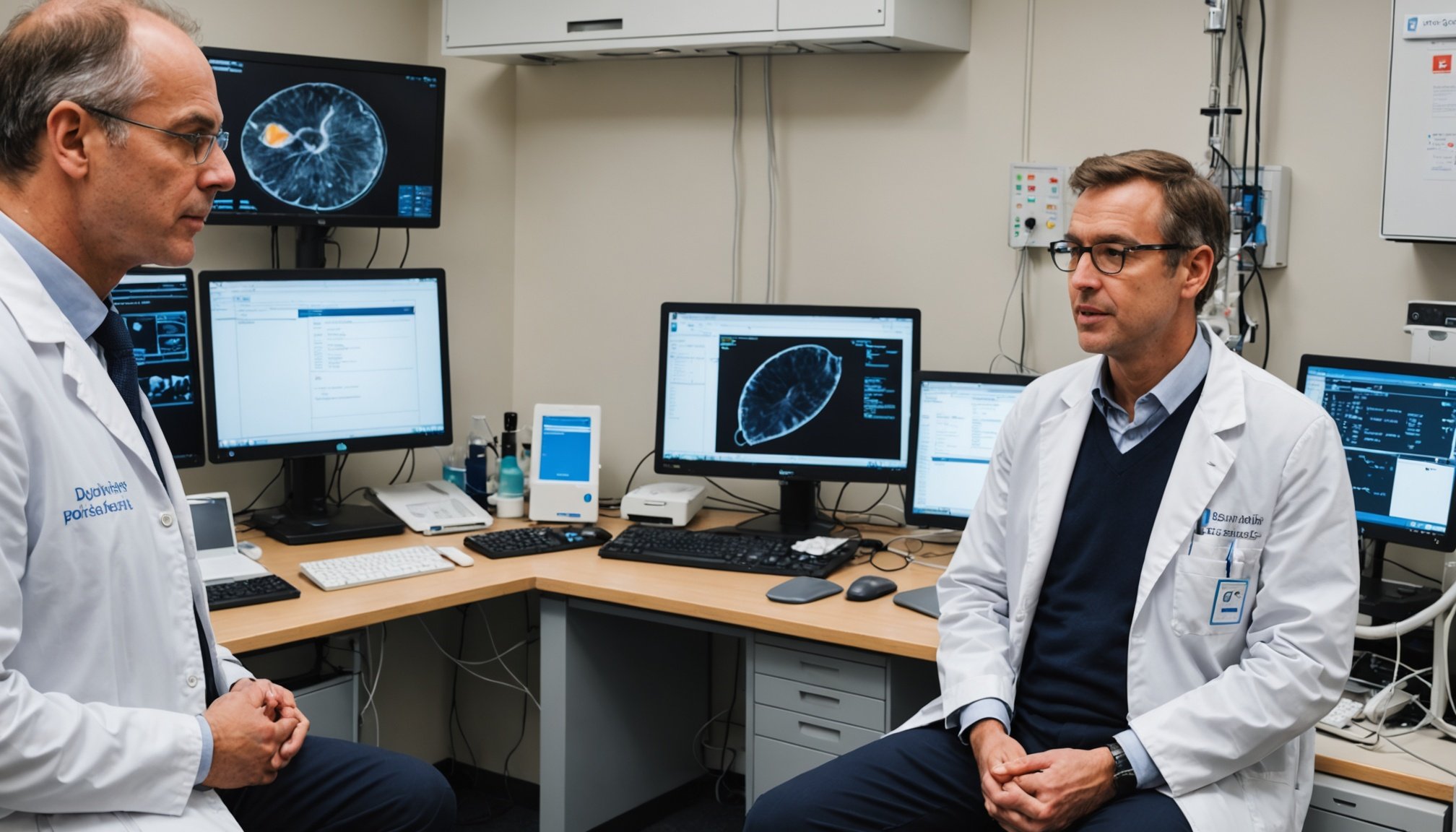Overview of Peritoneal Dialysis Innovations
Peritoneal dialysis has undergone remarkable transformations since its inception. Historically, peritoneal dialysis was a cumbersome process. Yet, with pioneering innovative techniques, it has evolved significantly, offering improved patient outcomes. Initially developed in the early 20th century, this life-saving procedure has benefited from continuous advancements in medicine and technology.
The role of innovation in this field can’t be overstated. Innovative techniques have reduced infection risks and enhanced the overall efficiency of treatments. Such advancements are crucial, as they directly impact patients’ quality of life, allowing them to manage treatments more conveniently and comfortably from their homes.
Also to discover : Enhancing Prostate Cancer Patient Follow-Up: The Role of Telemedicine for UK Urologists
In the UK, leading nephrologists have been at the forefront of these developments. These specialists focus on refining processes, ensuring safer and more effective procedures. By collaborating with researchers and technologists, they strive to push boundaries, setting new standards in peritoneal dialysis.
As we look to the future, the emphasis remains on integrating new technologies. The introduction of smart devices and better fluid management systems demonstrates the potential to further revolutionize dialysis experiences. With these ongoing efforts, the hope is to continually enhance the lives of those reliant on these critical treatments.
This might interest you : Top Non-Surgical Strategies for UK Cardiologists in Managing Aortic Dissection: Best Practices Unveiled
Novel Techniques in Peritoneal Dialysis
In recent years, advanced peritoneal dialysis techniques have brought significant improvements to patient care. From automated methods to custom solutions, the latest innovations focus on enhancing efficacy and patient comfort.
Automated Peritoneal Dialysis (APD)
Automated Peritoneal Dialysis, or APD, stands out as a revolutionary approach in peritoneal dialysis. By employing machine-controlled exchanges, it streamlines the process and conveniently operates overnight. This is especially beneficial as it allows patients to carry on with their daily activities uninterrupted by dialysis sessions.
The key advantage of APD is its ability to offer greater flexibility and control compared to traditional techniques. Clinically, APD has demonstrated improved fluid balance and toxin removal, essential for better health outcomes. Patients often report enhanced quality of life due to the reduction in daily dialysis duties.
New Dialysis Solutions
Innovative methods in the dialysate compositions have also seen notable progress. These new solutions focus on improving solute clearance and enhancing patient comfort. For instance, updated dialysate formulations have been shown to reduce irritation and provide a more comfortable experience during dialysis.
Recent studies underscore the long-term safety and efficacy of these novel solutions, revealing consistent improvements in clinical outcomes. As such, they represent a vital component in the move towards more personalized peritoneal dialysis strategies.
Expert Opinions from Leading UK Nephrologists
When it comes to advancing patient care, the role of nephrologist insights is invaluable. Their clinical expertise offers a critical viewpoint on innovations in the field. Prominent nephrologists in the UK emphasize the integration of technical advancements with traditional care frameworks. Dr. Emily Summerton, a leading nephrologist, noted, “The fusion of technology with our established methods can revolutionize treatments but must always complement our clinical expertise not replace it.”
The input from nephrologists is especially crucial for peritoneal dialysis advancements. Insights from these specialists are paving the way for more personalized and effective treatment options. According to Professor Harold Green, another respected voice in the community, “Our challenge is ensuring these innovations translate into tangible improvements in patient outcomes.” His focus is continually on patient-centric solutions, ensuring improvements aren’t just theoretical.
Looking to the future, nephrologist insights highlight the promise of biotechnology in transforming treatment landscapes. They foresee advancements that could provide less invasive and more efficient dialysis solutions. The balance of cutting-edge technology with empathetic patient care underscores the forward-thinking approach that UK nephrologists advocate for. Their clinical expertise combined with innovative perspectives ensures a holistic advancement in nephrology care.
Clinical Outcomes and Evidence-Based Research
Understanding the impact of clinical research on patient outcomes is crucial to advancing healthcare practices. The integration of evidence-based medicine ensures that medical professionals can provide the most effective care. This section delves into recent advancements and their implications for healthcare.
Recent Studies on Innovative Techniques
Recent studies have shed light on innovative methodologies that surpass traditional approaches. In a recent comparison, these new techniques demonstrated higher efficacy in certain patient outcomes. Key research has shown that incorporating advanced technologies can significantly enhance treatment protocols, potentially revolutionising patient care. The implications are vast; practitioners might need to re-evaluate current practices to incorporate these improvements, thereby optimising patient recovery and satisfaction.
Long-term Follow-up and Analysis
The significance of longitudinal studies in assessing evidence-based medicine cannot be overstated. These studies aid in understanding the sustained impacts of treatments on patient quality of life. Follow-ups indicate that patients benefit from continuous monitoring, highlighting areas for improvement. Future research directions must focus on expanding these longitudinal analyses to develop comprehensive healthcare strategies, ensuring both immediate and long-term patient wellbeing. Engaging in further clinical research will refine these strategies, providing a clearer roadmap for enhanced healthcare delivery.
Challenges and Considerations in Implementation
Introducing new nephrology techniques often presents a myriad of implementation challenges. Chief among these is the resistance due to established practices. Healthcare providers accustomed to traditional methods may hesitate to adopt innovations, given the necessary shift in routines and processes. To address this, comprehensive training and education are pivotal. By equipping professionals with the knowledge and skills to operate new technologies confidently, these barriers can be gradually mitigated.
Another layer of complexity is patient adaptation. Patients can vary significantly in their responsiveness to nephrology treatments. Their unique circumstances and preferences need to be considered. Effective patient education is crucial in fostering this adaptability. When patients are informed about their treatment’s essence and benefits, their engagement and satisfaction levels tend to rise, leading to improved outcomes.
Moreover, patient engagement isn’t solely about information dissemination. It involves actively listening to patient concerns, adapting treatments to suit individual needs, and ensuring consistent communication. These strategies can substantially increase success rates in nephrology care.
Despite these challenges, by focusing on tailored education and adaptation practices, healthcare providers can work towards seamlessly integrating novel techniques, ultimately enhancing patient care and treatment efficacy.
Conclusion and Future Directions
The future of peritoneal dialysis is promising, with ongoing advancements in nephrology paving the way for improved patient care. As researchers delve deeper into innovative solutions, the emphasis on enhancing dialysis techniques is growing. Current insights suggest that integrating cutting-edge technology with traditional methods could dramatically improve outcomes for patients reliant on peritoneal dialysis.
Ongoing research and innovation remain crucial. The medical community is constantly exploring new treatment protocols and tools to enhance the effectiveness of peritoneal dialysis. From biocompatible dialysis solutions to automated systems that simplify the dialysis process, the scope for progress is immense. These innovations not only aim to improve the quality of dialysis but also strive to make the process as convenient as possible for patients.
Collaboration is key in the realm of nephrology advancements. Healthcare providers, researchers, and technology experts must work together to push the boundaries of what is possible. By pooling resources and knowledge, the potential to revolutionise patient care improves significantly. In the future, we can envisage a healthcare landscape where patient-focused care solutions are sustainable and adaptable, ensuring that all individuals receive the attention they need. This collaborative approach will undoubtedly drive consequential improvements in patient care.











